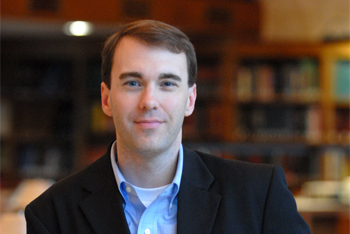Editor’s note: To see the entire series, click here.
The United Church of Christ no longer has the resources to support all the levels and settings of the church, said Susan Towner-Larsen, minister for conference relations. Towner-Larsen works with a think tank to develop ideas for adaptive change and encourages the UCC to experiment with doing things differently as an institution while remaining true to its essence.
Towner-Larsen joined the UCC Office of General Ministries in September 2008 after serving on the staff of the Ohio Conference from 1987 to 2004. She also served as minister for local parishes in Washington and Iowa. As a member of the general ministries team, Towner-Larsen facilitates communications between local conferences and the national setting of the UCC.
Towner-Larsen spoke to Faith & Leadership about changes in the UCC as well as her book on quilting as a spiritual practice. The video clip above is an excerpt from the following edited transcript.
Q: Were you raised in a United Church of Christ congregation?
I was raised in Episcopal and Presbyterian churches but became part of the United Church of Christ in 1982. When I found the UCC it felt like home. I’ve served local churches, and worked for the Ohio Conference staff for 18 years. Now I serve on the national staff in Cleveland, Ohio, as the minister for conference relations.
Q: What does that job entail?
I do bridging between conferences and the Office of General Ministries (OGM) in the national setting of the church, known as the Church House. I keep one apprised of the other and make connections between the two.
Q: You’ve been involved in a UCC think tank on adaptive changes needed for flourishing as the UCC. What does the term “adaptive changes” mean in this context?
Adaptive change is anything that helps us think outside the box and do things in a way that’s different than we’ve ever done them before. A technical change, of course, would be something that we can respond to and address with the present structures or present resources. Adaptive change means experimentation and thinking that takes us in completely new directions.
Q: What role do you see for the national Church House in bringing about this kind of adaptive change?
The national setting is very important for creating space for [adaptive change] in intentional ways. Conversations are popping up everywhere about the need for this change but we need centralizing and intentionality that the national setting can help provide.
Q: What are these conversations about? Why the need for this change?
Finances, of course, pushed us to begin with, but now it is more about what the church of Jesus Christ is going to look like in the coming years. How do we meet the changing cultural realities and the changing needs in people’s lives? Where is God leading us now? How do we listen to the movement of the Spirit in this time and in this place?
Q: In a report to the OGM board, you said the think tank is addressing questions of how to broaden the sense of urgency about the need for a change. Given the challenges the UCC faces, why is it difficult to build a sense of urgency?
That is an interesting question because the urgency feels so present. It is human nature to put things on the back burner that are hard to think about. Change is fearful and it is easy to think either we have to go it alone, which is really scary, or maybe it is not as urgent as we think it is and we can put it aside until later.
We do that collectively, too. We can have this collective amnesia about the urgency we felt five minutes ago or a month ago. It is reassuring that the conversations pop up in community. That speaks to our need for each other and our need to address this together and discern the Spirit’s movement together. That’s the encouraging bit.
Q: What are people talking about in these community conversations?
They’re focused on where the church is going, what does God want it to look like in the future; how do we discern that and what direction might the church take as we move further into this century? Our resources are changing. The [necessity of] responding to immediate needs is dramatic. We’re at a threshold that demands a response of the church.
Q: In the same report you talked about naming some elephants in the room. What are those elephants?
One of the elephants in the United Church of Christ is our funding stream. Offerings to the United Church of Christ come through our local congregations to the middle judicatory to the national setting. What gets retained in each of those settings is not a matter of consultation. That’s got to change.
The hard part to think about -- one of the big elephants in the room -- is that all our ministry positions may be on the line. We have to put it all out on the table and say, “The staffing of the church of Jesus Christ may look very different.”
That may mean my position won’t be there or the conference minister position won’t be there or a local church position may have to change. That’s an elephant we haven’t addressed very well yet.
Q: Why do you think that the jobs will have to be on the table?
One reason is pure funding. We don’t have the resources anymore to support all the levels and settings of the church that we have found helpful and needful in the past. That’s certainly a piece of it. We’ve got to think outside the box as far as we can go. The structures that have held us together may have to change dramatically, and that means our positions will change dramatically.
Q: What happens to a denomination when you reach a point where you have to rethink traditional structures? What is the essence that’s left?
That’s what the UCC is struggling to define right now. We have an understanding of the gospel that we think people are yearning for -- our sense of radical hospitality, our sense of inclusiveness, everyone is welcome, our sense of early truth-telling and being on the forefront of social justice issues.
We sense that’s the essence of who we are and that’s what people yearn for. Other denominations do those things, too, to varying degrees, but that’s the core of who we are. That’s what we hope to take forward into the future. The question is how to do that, and how will our brother and sister denominations do the same.
Q: As you look at new structures, are there any particular models that you’d like the UCC to consider?
Frankly, I haven’t seen too many models emerging yet. There are some that are structured around small groups and house churches. There are responses that say we’re going to have to do with fewer buildings, maybe no buildings. The costs of buildings and of camps are pulling us down. There are some elements that we know may go, but I haven’t seen any models yet that are really taking us into the future. The models are emerging as we speak.
Q: Is there a date or outcome for restructuring the UCC?
No. We’re not looking to restructure the institution. We are in the midst of unifying some of our boards in the national setting. Some of our conferences have done that. Certainly our staff situations have changed and been reconstructed in the middle judicatories. Now it is more a matter of vision and of the nature of the church that we’re wrestling with and trying to move forward.
Q: On another topic, I know that you have written a book called “With Sacred Threads: Quilting and the Spiritual Life.” How does quilting fit in with your Christian practice?
At the same time I was being trained to be a spiritual director in a 2 ½-year intensive program, I was taking classes in quiltmaking. My friend Barb was doing both of those things with me. The two of us would sit there sewing and we’d be talking about our spiritual direction class. The parallels between the practices of the spiritual life and the traditions of quilting just jumped out at us.
For instance, the practice of sitting at a quilting frame and having time for solitude is very centering. A lot of quilting is done in solitude and yet you come together with other women to take a class. Our foresisters gathered around a quilt frame. I can’t do that without being reminded of the communion of the saints. All the women who have gone before us and quilted their sacred stories and art into one fabric are really powerful to me; they are very intimately connected.
Q: You mentioned being trained as a spiritual director. How does that training inform your work, which sounds more bureaucratic and perhaps less personal in nature?
I was excited to take this position and see how I might integrate the two. Spiritual direction is about tending to the movement of the Spirit and, when you’re doing one-on-one direction, you’re giving your full attention to the movement of the Spirit in another person’s life.
In the work that I do, I give attention to where the Spirit is moving in our institution and try to find sacred space to lift that up … to be a person in the midst of all the institutional dynamics to say, “Where is God leading this conversation?” or “Where is the Spirit moving in this gathering?”
It sounds like an obvious thing for the church to tend to, but we don’t often. We’re not very practiced at doing it intentionally, so I find great excitement in doing it in places like this.








